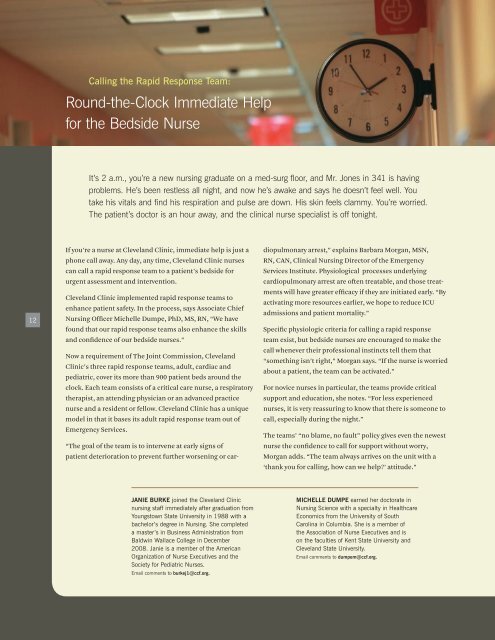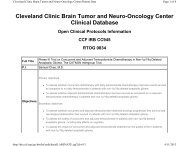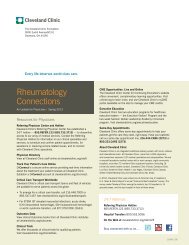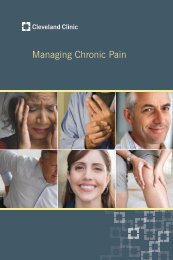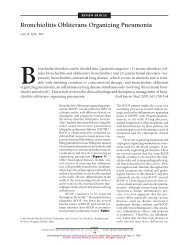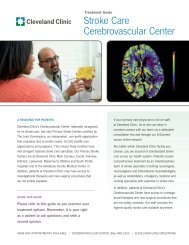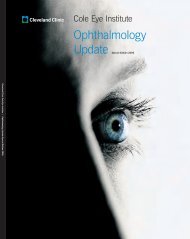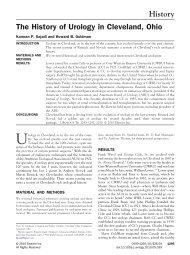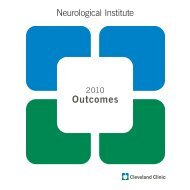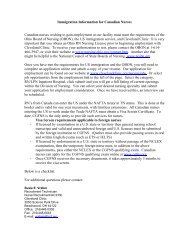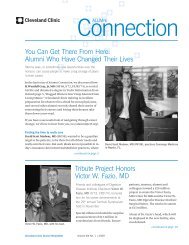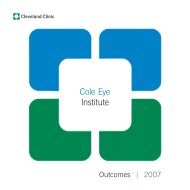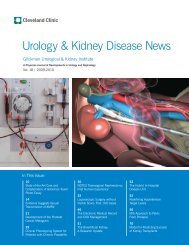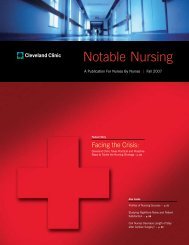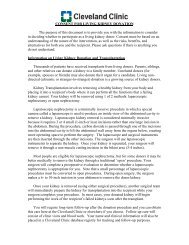Create successful ePaper yourself
Turn your PDF publications into a flip-book with our unique Google optimized e-Paper software.
12<br />
<strong>Notable</strong> <strong>Nursing</strong> clevelandclinic.org/notable<br />
Calling the Rapid Response team:<br />
Round-the-Clock Immediate Help<br />
for the Bedside Nurse<br />
It’s 2 a.m., you’re a new nursing graduate on a med-surg floor, and Mr. Jones in 341 is having<br />
problems. He’s been restless all night, and now he’s awake and says he doesn’t feel well. You<br />
take his vitals and find his respiration and pulse are down. His skin feels clammy. You’re worried.<br />
The patient’s doctor is an hour away, and the clinical nurse specialist is off tonight.<br />
If you’re a nurse at <strong>Cleveland</strong> <strong>Clinic</strong>, immediate help is just a<br />
phone call away. Any day, any time, <strong>Cleveland</strong> <strong>Clinic</strong> nurses<br />
can call a rapid response team to a patient’s bedside for<br />
urgent assessment and intervention.<br />
<strong>Cleveland</strong> <strong>Clinic</strong> implemented rapid response teams to<br />
enhance patient safety. In the process, says Associate Chief<br />
<strong>Nursing</strong> Officer Michelle Dumpe, PhD, MS, RN, “We have<br />
found that our rapid response teams also enhance the skills<br />
and confidence of our bedside nurses.”<br />
Now a requirement of The Joint Commission, <strong>Cleveland</strong><br />
<strong>Clinic</strong>’s three rapid response teams, adult, cardiac and<br />
pediatric, cover its more than 900 patient beds around the<br />
clock. Each team consists of a critical care nurse, a respiratory<br />
therapist, an attending physician or an advanced practice<br />
nurse and a resident or fellow. <strong>Cleveland</strong> <strong>Clinic</strong> has a unique<br />
model in that it bases its adult rapid response team out of<br />
Emergency Services.<br />
“The goal of the team is to intervene at early signs of<br />
patient deterioration to prevent further worsening or car-<br />
JANIe BuRke joined the <strong>Cleveland</strong> <strong>Clinic</strong><br />
nursing staff immediately after graduation from<br />
youngstown State university in 1988 with a<br />
bachelor’s degree in <strong>Nursing</strong>. She completed<br />
a master’s in Business Administration from<br />
Baldwin Wallace College in December<br />
2008. Janie is a member of the American<br />
organization of Nurse Executives and the<br />
Society for Pediatric Nurses.<br />
Email comments to burkej1@ccf.org.<br />
diopulmonary arrest,” explains Barbara Morgan, MSN,<br />
RN, CAN, <strong>Clinic</strong>al <strong>Nursing</strong> Director of the Emergency<br />
Services Institute. Physiological processes underlying<br />
cardiopulmonary arrest are often treatable, and those treatments<br />
will have greater efficacy if they are initiated early. “By<br />
activating more resources earlier, we hope to reduce ICU<br />
admissions and patient mortality.”<br />
Specific physiologic criteria for calling a rapid response<br />
team exist, but bedside nurses are encouraged to make the<br />
call whenever their professional instincts tell them that<br />
“something isn’t right,” Morgan says. “If the nurse is worried<br />
about a patient, the team can be activated.”<br />
For novice nurses in particular, the teams provide critical<br />
support and education, she notes. “For less experienced<br />
nurses, it is very reassuring to know that there is someone to<br />
call, especially during the night.”<br />
The teams’ “no blame, no fault” policy gives even the newest<br />
nurse the confidence to call for support without worry,<br />
Morgan adds. “The team always arrives on the unit with a<br />
‘thank you for calling, how can we help?’ attitude.”<br />
MICHeLLe DuMPe earned her doctorate in<br />
<strong>Nursing</strong> Science with a specialty in Healthcare<br />
Economics from the university of South<br />
Carolina in Columbia. She is a member of<br />
the Association of Nurse Executives and is<br />
on the faculties of kent State university and<br />
<strong>Cleveland</strong> State university.<br />
Email comments to dumpem@ccf.org.


